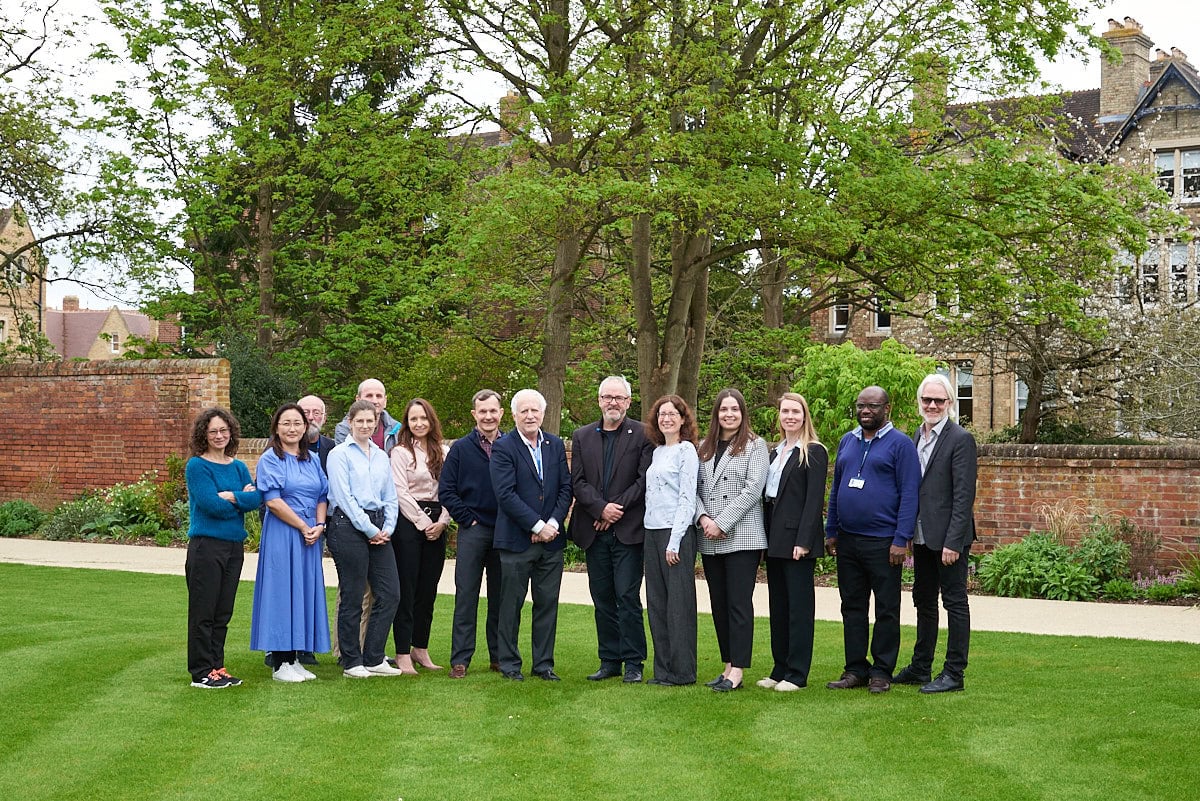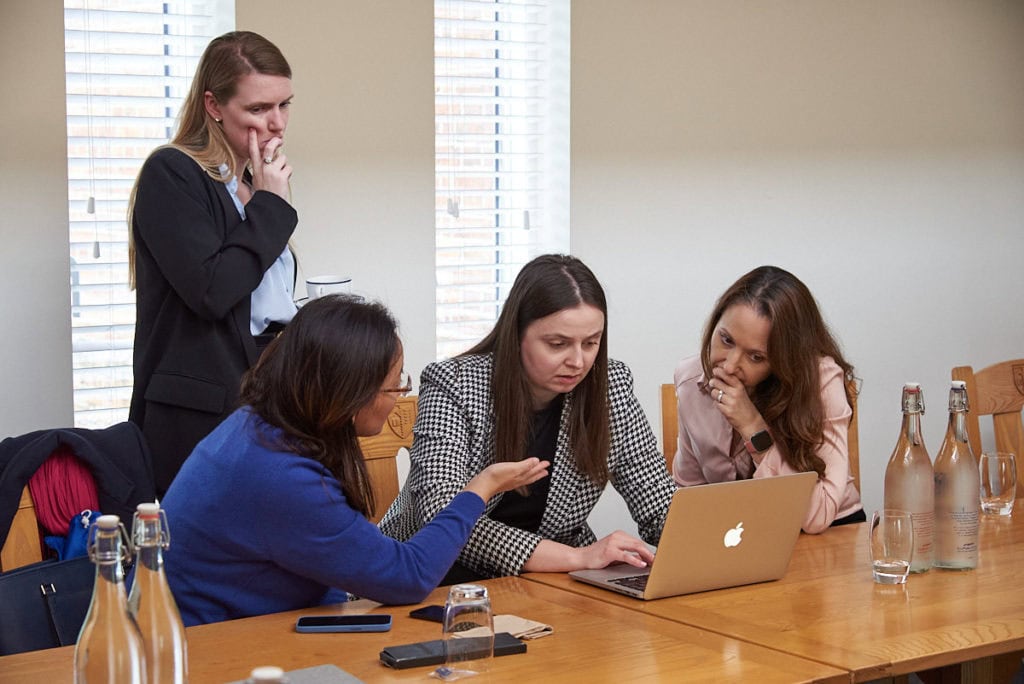Our people
Founding Partner & Steering Committee Member Organisations
- Bond University, Australia
- University of Calgary, Canada
- McMaster University, Canada
- Oslo Metropolitan University, Norway
- University of Oxford, UK

Professor John Conly, Associate Professor Kirsten Fiest, Professor Tom Stelfox*, University of Calgary, Alberta, Canada
Dr Victoria Haldane, University of Toronto, Ontario, Canada
Professor Carl Heneghan, Dr Annette Plüddemann, Dr Georgia Richards, University of Oxford, UK
Professor Paul Glasziou, Bond University, Queensland, Australia
Dr Mark Loeb, McMaster University, Hamilton, Ontario, Canada
Dr Atle Fretheim, Oslo Metropolitan University, Norway
* Now posting at the University of Alberta
Professor John Conly (Chair), University of Calgary, Alberta, Canada
Dr Annette Plüddemann, University of Oxford, UK
Professor Carl Heneghan, University of Oxford, UK
Dr Georgia Richards, University of Oxford, UK
Dr Sara Gandini, European Institute of Oncology, Italy
Dr Igho Onakpoya, UK
Dr Elena Cecilia Rosca, Victor Babes University of Medicine and Pharmacy Timisoara, Romania
Susanna Maltoni, IRCCS AOUBO, Bologna, Italy
Associate Professor Kirsten Fiest, University of Calgary, Alberta, Canada
Dr Mark Loeb, McMaster University, Hamilton, Ontario, Canada
Dr Victoria Haldane, University of Toronto, Ontario, Canada
Dr Oyuka Byambasuren, Bond University, Queensland, Australia
Associate Professor Mark Jones, Bond University, Queensland, Australia
Dr Atle Fretheim, Oslo Metropolitan University, Norway
Dr Tom Jefferson*, University of Oxford, UK
Assistant Professor Jenine Leal, University of Calgary, Alberta, Canada
Jessica Bartoszko PhD candidate, McMaster University, Hamilton, Ontario, Canada
* Not active
Georgia Richards is a researcher and teacher at the Centre for Evidence-Based Medicine, University of Oxford. During her DPhil Georgia sought out open data, including coroner’s reports, global narcotics data, sales of over-the-counter medicines and private prescription data developing tools such as the Oxford Catalogue of Opioids and the Preventable Deaths Tracker. The Preventable Deaths Tracker has gained national interest from the UK’s Chief Coroner’s Office, the Ministry of Justice, the media, bereaved families, and the public, receiving over 9,000 monthly visitors. These skills in data collation, open science and her work on preventable deaths will be highly valuable to the collaboration.
Jessica Bartoszko is a methodologist and infectious disease epidemiologist. She completed her PhD in the Health Research Methodology program at McMaster University, Hamilton, Ontario, Canada. Jessica has 30+ peer-reviewed publications and 5+ years of experience in evidence synthesis and evaluation. She has led the design, coordination, execution and publication of studies that have informed practice guidelines and policy on influenza vaccination, personal protective equipment and drugs for COVID-19. Jessica’s interests also include topics related to hospital epidemiology, antimicrobial resistance and non-pharmacological interventions for infection prevention and control.
Jenine Leal is an Assistant Professor at the University of Calgary whose research focuses on developing, implementing, and evaluating the impact of novel approaches to infection prevention and control to improve patient safety, outcomes, and lower healthcare costs. She conducts population-based, epidemiological, economic, and validation studies using large surveillance and administrative datasets related to existing and emerging infectious diseases, including antimicrobial resistance. Jenine was an active writer for the AHS COVID-19 Scientific Advisory Group and completed 6 reports that informed practice and policy in AHS. She also developed the Alberta COVID-19. Analytics Research Database is a population-based database using secondary data sources to understand local epidemiology and resource use implications of COVID-19.
Oyungerel Byambasuren is an academic general practitioner and a postdoctoral researcher at the Institute for Evidence-Based Healthcare, Bond University. Oyungerel completed her PhD degree on the effectiveness of mHealth apps and their usability in primary care and since completing has been working on projects to increase uptake of non-drug interventions, reduce overdiagnosis, and to close evidence-practice gaps in general practice. Other projects include COVID-19 research, answering high-priority questions such as the prevalence of asymptomatic cases, seroprevalence, role of eye protection in prevention, and impact of COVID-19 vaccinations on long COVID.

Adam S. Komorowski is a Canadian-Italian consultant medical microbiologist and research methodologist with a clinical infectious disease practice at McMaster University, where he is a part-time Assistant Professor. Adam completed his bachelor’s degree at the University of Toronto and his medical degree in Ireland, ultimately returning to Canada to pursue his speciality training in medical microbiology at McMaster University. He is currently completing a master’s degree in Health Research Methodology through a government-funded Clinician-Investigator Program fellowship at McMaster University. Adam has published over 30 peer-reviewed papers, including pharmacologic guidelines co-authored with the COVID-19 Science Advisory Table in the Canadian province of Ontario. He currently serves on the steering committee of the phase 2 AeroVax trial evaluating a novel multivalent SARS-CoV-2 vaccine delivered by inhaled aerosol. Pillars of interest: Diagnostics and Transmission; Interventions and Evidence.
Elizabeth Thomas is a Pandemic Evidence Fellow based in Brisbane, Australia. She recently completed her DPhil as a Clarendon Scholar at the Centre for Evidence-Based Medicine, where her research examined variation in paediatric diagnostic testing. She is currently undertaking her specialty training in paediatrics. Her research interests include strengthening the evidence base in paediatric diagnostics and reducing unwarranted variation to improve the quality of care delivered to children. Her work within the collaboration will primarily focus on Diagnostics and Transmission (Working Pillar 1) as well as Interventions and Evidence (Working Pillar 2).
Kevin Bardosh is the director and head of research at Collateral Global, a UK-based think tank focused on improving pandemic response through a deep study of the lessons learned from Covid. A medical anthropologist, he has worked in more than 20 countries worldwide on infectious disease control, including Ebola and Zika. His current work focuses on the social harms (or unintended consequences) of public health policies, political decision-making, the politicization of science (i.e. infection control and vaccination), legal and constitutional issues, and viewpoint diversity in medicine and public health.
Yuan Zhang, an Assistant Clinical Professor (Adjunct) in the Department of Health Research Methods, Evidence, and Impact at McMaster University, and an assistant professor at Brock University. Yuan’s research focuses on evidence-based decision-making, guideline development, patient and public values, economic evaluation, and health technology assessment. He has published more than 60 peer-reviewed articles.
Eman Abukmail (MD, MSc) is a PhD candidate (submitting Sep 24) at the Institute for Evidence-Based Healthcare, Bond University, Australia. She is also involved in teaching evidence-based medicine, shared decision making and communication skills for medical students at Bond University. Her research focuses on improving the communication of prognosis and natural history of illnesses and the related ‘wait and see’ option to support informed decisions. Dr Abukmail leads the Shared Decision Making Early and Middle Career Researcher (ISDM EMCR) Network. She is actively engaged in initiatives to enhance healthcare communication and delivery, particularly in low- and middle-income countries (LMICs). As an Evidence-Informed Fellow at The Pandemic Evidence Collaboration, she will contribute to Pillars 2 and 3.
Ingeborg Hess Elgersma is a researcher with the Centre for Epidemic Intervention Research at the Norwegian Institute of Public Health. She conducts pragmatic randomised trials of public health and social measures for infection control. During the pandemic, Ingeborg authored several quasi-experimental studies based on Norwegian registry data. She also focused her research on social disparities in COVID-19 prevalence.
Guosong Wu is a CIHR postdoctoral researcher at the Centre for Health Informatics, University of Calgary. With a robust background in health services research and medicine, Dr. Wu’s expertise lies in measuring care quality and safety through machine learning-driven analytics of structured and unstructured electronic medical records and administrative databases. During the COVID-19 pandemic, he developed ICD-10 algorithms that improved case identification, enabling large-scale cohort studies and the evaluation of both clinical and non-pharmaceutical interventions. Currently, he leads research on the impact of non-pharmaceutical interventions on adverse events in hospitalized patients, aiming to evaluate the effectiveness of these interventions and improve the accuracy of adverse event detection.
Elissa Rennert-May is an Infectious Diseases physician and an assistant professor at the University of Calgary in the Departments of Medicine, Community Health Sciences, and Microbiology, Immunology and Infectious Diseases. Dr Rennert-May does research related to health economics and health services particularly in the areas of antibiotic stewardship/antibiotic resistance and infection prevention and control. She has done several research projects around the COVID pandemic including the creation of a COVID database, and is currently working on projects related to non pharmaceutical interventions to prevent transmission of respiratory viruses. Her pillars of interest are Pillars 2 and 3 – Interventions and Evidence, and Practice and Policy.
Fariba Aghajafari is an Academic Family Physician and Associate Professor in the Department of Family Medicine and Community Health Sciences at the University of Calgary. Her expertise includes evidence-based medicine, pregnancy and child health, nutrition, refugee health, and health services research. She has extensive experience in both qualitative and quantitative research, including systematic and scoping reviews, with her most recent work focusing on vaccine delivery models for refugee populations during pandemic. During COVID-19, Fariba analyzed public health, acute care, and primary care data to assess how the COVID-19 Integrated Pathway (CIP) supported informational continuity. She also investigated vaccination models for newcomers and refugees, emphasising the role of partnerships and trusted intermediaries in overcoming vaccine hesitancy and barriers to care.
Nashit Chowdhury is a dedicated researcher and PhD student at the University of Calgary, specializing in Population and Public Health. With a background in medicine (MBBS from Bangladesh) and Data Analytics, Nashit brings a unique interdisciplinary approach to his work. His thesis focuses on the mental health impacts of COVID-19, particularly on visible minority essential workers, and he is deeply committed to improving the healthcare system by addressing social determinants of health. Nashit has contributed to 50 publications and has been involved in both qualitative and quantitative studies that explore population and public health topics. As a fellow of The Pandemic Evidence Collaboration, Nashit aims to engage in generating high-quality evidence for non-pharmacological interventions during pandemics, helping to inform policy and care decisions. This collaboration allows him to apply his expertise in public health to contribute to the development of research protocols that can be rapidly deployed during future pandemics. In addition to his research, Nashit is passionate about community engagement, knowledge translation, and developing equitable health policies that improve the lives of vulnerable populations.

Top row: Adam Komorowski, Elizabeth Thomas, Yuan Zhang; Middle Row from left to right: Eman Abukmail, Ingeborg Hess Elgersma, Guosong Wu; Bottom row, from left to right: Elissa Rennert-May, Fariba Aghajafari, Nashit Chowdury.